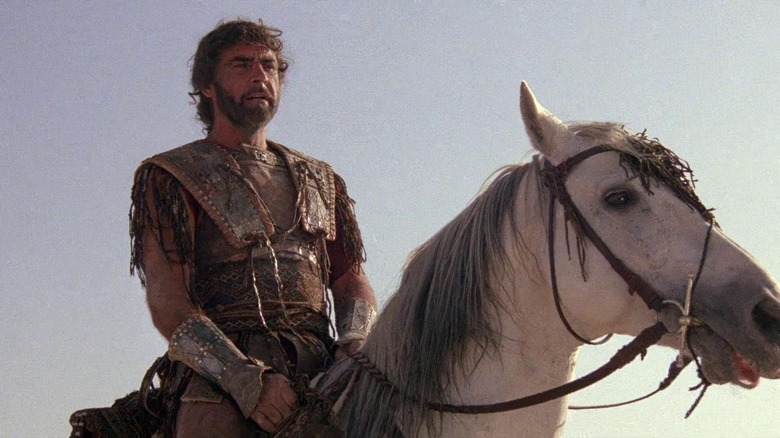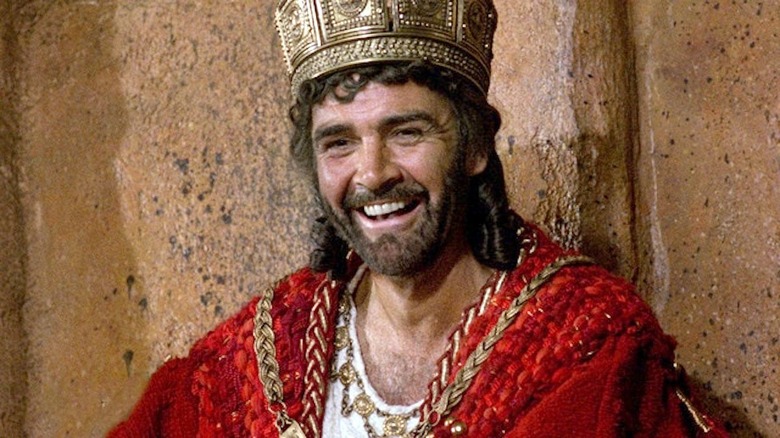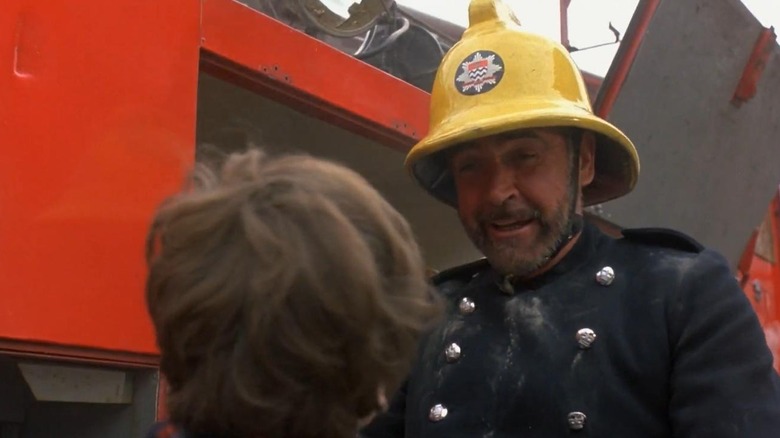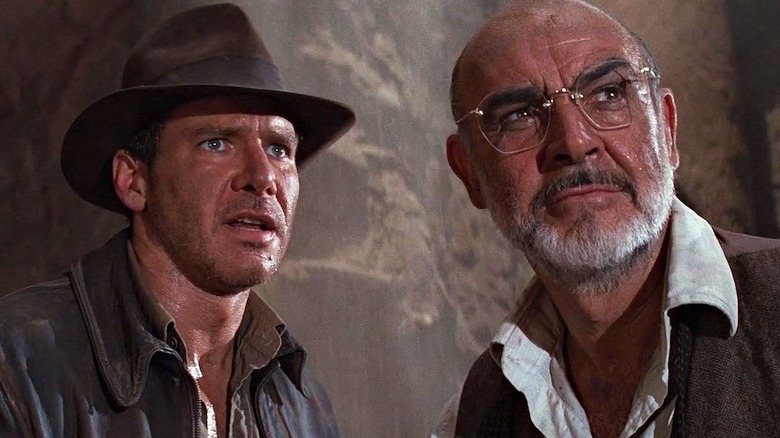Sean Connery Saved Terry Gilliam From An Over-Ambitious Time Bandits Script
Since its release in 1981, Terry Gilliam's "Time Bandits" has become a bonafide modern classic that functions as a rite of passage for British youths whose parents grew up on the surrealist comedy of Monty Python. The magic of the film is still very much alive today, with Taika Waititi bringing a "Time Bandit" TV series to Apple TV+.
Before 1981, Gilliam had helmed another lesser-known fantasy adventure movie called "Jabberwocky," which was based on a poem by Lewis Carroll. But it was "Time Bandits" that officially put him on the map as a visionary filmmaker. His work on the film, however, didn't start out so great — Gilliam had originally conceived of a much grander film, but the epic set pieces he had planned may have been too ambitious for him to realistically pull off so early in his directing career.
Luckily, the script that he and writing partner Michael Palin conjured up featured a private joke where mega-star Sean Connery was featured as King Agamemnon, a casting choice they never thought would come to fruition. As it turned out, Connery was apparently a fan of Monty Python and agreed to appear in the film after a little arm-twisting from George Harrison's longtime manager, Denis O'Brien. Connery's decision to accept the role led to some advice from the veteran actor on set, resulting in Gilliam agreeing to simplify the story so they could actually get the adventure film made on time and on budget.
Gilliam was completely overwhelmed on location in Morocco early on during the "Time Bandit" shoot, and admitted to The Hollywood Reporter in 2020 that the actor who once played James Bond, "literally saved my ass."
Connery's experience was invaluable on set
Historically, Terry Gilliam has fought with others about making sure he had control over delivering a finished film that meets his high standards and satisfies his uncompromising vision, but in the case of "Time Bandits," the spirited director had nothing but praise for Sean Connery. Here's what he told THR about his experience working with the actor:
"Sean looked at my storyboards, and says, 'Forget about that, you're not gonna get this done, kid.' So I started throwing pages out. Anything he said, it was 'Yes, sir.' I suddenly felt like I was in the hands of an incredible actor with great experience. And we got through that first day thanks to his pragmatism and not my ambition."
Given the level of respect that Gilliam showed Connery, at least by his recollection, it's surprising that the two artists never collaborated again. Gilliam has a theory, however, as to why Connery accepted such an unconventional role as King Agamemnon. The mythical story of "Time Bandits" centers around a young boy named Kevin (Craig Warnock) who is whisked away by a group of time-traveling dwarves in possession of an enchanted map. At one point in the story, Kevin is temporarily adopted by Agamemnon, giving Connery an opportunity to live vicariously through his character. "I'm convinced the reason he said yes was that he was having some guilt feelings about having been an absent father," Gilliam theorized. "And here was a chance to be a surrogate father."
A memorable ending, thanks to Connery's accountant
Sean Connery's real life influenced "Time Bandits" in another profound way by changing the entire ending of the film. On a quick day of shooting pick-ups in England, Terry Gilliam and the crew had to work around the in-demand actor's busy schedule.
Connery was actually shooting "Outland" with Peter Hyams at the time, but was able to go to the "Time Bandits" set for a quick shot that turned the movie into a dream-like fairy tale that may or may not have actually happened. That shot — where he shows up as a fireman at the end of the film — was the actor's idea, and it also allowed Connery to be another version of a surrogate dad to Kevin. It was also convenient for Connery to be in England so he could make a quick stop to meet his accountant. Gilliam told THR (via MovieWeb):
"[Connery] was back in England for, I think, a day meeting his accountant. And I managed to get him to come out the middle of nowhere to just put on a fireman's helmet, wink and get in the truck and go, and that was it. And it ended up this brilliant ending that wouldn't have been there if it hadn't been for Sean and his tax problems."
It's a head-trip of an ending, for sure. The success of "Time Bandits" allowed Gilliam to get "Brazil" off the ground and enjoy a long directing career, even if some of his films haven't always lived up to his mad hatter energy and unbending vision. The two never worked together again, but they did have a reunion once on the set of another high adventure film that wound up being the second highest grossing film of 1989.
Gilliam, Connery, and Spielberg
Terry Gilliam and Sean Connery met up again at the London studios where Steven Spielberg happened to be filming another action film with a father-son theme: "Indiana Jones and the Last Crusade." After Connery's unfortunate passing on Halloween in 2020, that "Last Crusade" encounter would be the last time the two would interact with each other. In the same interview, Gilliam told The Hollywood Reporter how Connery had a very unique arrangement with Paramount Pictures:
"[Steven] Spielberg's doing his stuff and I'm just taking to Sean. And the thing that Sean was talking about was how proud he was that he was the first and only actor at that time who got his money directly from the studio."
Gilliam assumed that was a situation brought on by Connery's worry that he would potentially get taken advantage of, even after such a long, legendary career — a career that was far from over at that point. The actor's roots may have played a part as well. "Sean got the money directly," Gilliam said. "And he was really proud. He was always still a working class guy. And he was Scots and you know, always feeling he's being f***ed by the English."
It sounds like the respect that Gilliam showed Connery years prior on "Time Bandits" was still very much intact decades later, and rightly so.



